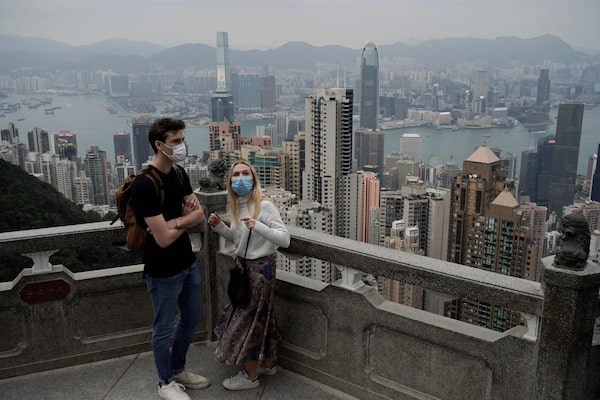
Tourists wear masks at the Peak, a popular tourist spot in Hong Kong, Feb. 9, 2020.Kin Cheung/The Associated Press
Ten days ago, Toronto couple Venus de Milo and Sheldon Miller arrived at Marina Bay Sands, a five-star hotel in Singapore, and were greeted by a sign at the front entrance that informed guests a man had been diagnosed with the coronavirus three days prior. “Management had done everything possible to disinfect the hotel,” the sign stated.
“It was unnerving to say the least,” says de Milo, who had debated cancelling their two-week trip to Singapore, Malaysia and Vietnam, but opted to push ahead after talking to the couple’s travel agent, insurance company and checking the Canadian government health advisory.
With the trip now almost over, she has not regretted their decision. However, she says the travel landscape has been dramatically altered and people should be cautious about the places they go to and the things they do.
“We followed the lead of our knowledgeable guides. We didn’t go to super-crowded places, we wore masks in medium-crowded ones and we washed our hands a lot,” says de Milo, who communicated via e-mail last weekend from the last leg of their trip in Saigon. “Frankly, the scariest things that happened were people trying to get us to eat embryo duck eggs and drink cobra venom snake wine. Other than that, we had one of the most fabulous trips of our lives. We just feel badly for the locals as tourism seems to be down at least 30 per cent everywhere we went.”
Countries in Asia and the Middle East, both currently in their high seasons, are suffering the most from the spread of the coronavirus, which has claimed more than 1,000 lives in China and infected close to 43,000 people. However, as Marion Joppe, a professor in tourism management at the University of Guelph, says, most countries, including Canada, know that their economies will also be affected – to the tune of billions of dollars in lost revenues around the world.
“The fear of the respiratory virus ... has brought the lucrative Chinese tourism industry to a standstill,” Joppe says. “Beijing has halted tour groups leaving China, and countries such as the U.S., Australia and Singapore are denying entry to foreign nationals who have recently been to China. Dozens of airlines [including Air Canada] have suspended flights to and from China, and cruise lines such as Royal Caribbean and Norwegian Cruise Line have cancelled sailing to and from China.
“It’s a mess, and it’s going to impact all the service providers to the tourism sector as well, including everything from farming, fishing and construction.”
To get a picture of the influence Chinese tourism has on the global economy overall, according to the United Nations World Tourism Organization, travel by Chinese globally makes up 20 per cent of the value of all tourism-related expenditures around the globe to the tune of US$277-billion. The next highest spending by country is Americans at US$144-billion and Germans at US$94-billion.
“Most destinations have become heavily reliant on the high-spending Chinese traveller, including Canada, which attracts 750,000 from mainland China a year,” says Greg Klassen, a principal with Twenty31, a tourism consultancy in Vancouver. “So it will spread here and the downturn will be felt as early as the spring. We are in prime tourism planning season and it’s pretty safe to assume that no one in China [who is] quarantined in their home is planning a trip to Canada or anywhere else in the world.”
The opposite is also true. Many Canadians are hesitating to step outside their borders.
“The way my clients are expressing it to me is ‘Why put myself in that situation if I don’t have to?’” says Ilana Valo, owner of a boutique travel consultancy in Toronto. “So far, though, we are reporting less cancellations and more shifts to other places that aren’t in as close proximity to China. But there are intrepid travellers who are not deterred. They are the ones who believe the health-care officials who keep repeating the risk of contracting the virus [outside China] is extremely low.”
That is a sentiment echoed by Isaac Bogoch, an infectious-disease specialist and physician with the University of Toronto. “Travellers need to be aware of where they are going, how they are getting there and know the latest [travel] restrictions, but they don’t need to cancel trips or stop thinking about future ones.
“Tourism deals in the world of perception, and when we hear of dozens of new cases of the coronavirus on a cruise ship docked off Yokohama, or about a so-called coronavirus ‘supercarrier’ who caught the virus in Singapore and infected people in France and the U.K., well of course, they get nervous," he adds. “But seasoned tourists know any type of travel contains risk. Their best defence is to be armed with the latest information and all the facts.”
De Milo says both she and her husband had “conflicted feelings” before they set off on their trip to Southeast Asia, but those doubts disappeared once they became comfortable with safety protocols that had been put in place by tour operators along the way. “For us and the other Canadians, American and worldwide travellers we encountered on this trip, the decreased volume of tourists was a godsend as we encountered smaller lineups, less traffic and easier access to everything.”
 Gayle MacDonald
Gayle MacDonald